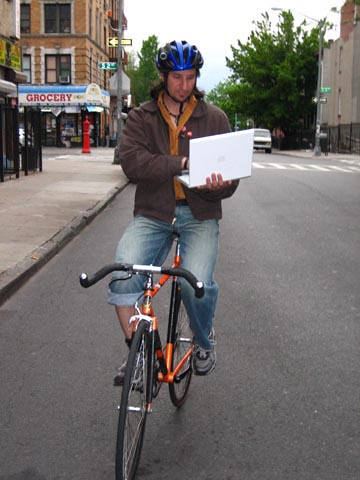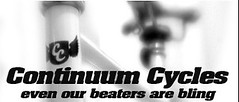Op-ed from NY TIMES on the bicycle vs congestion pricing.
(a related article in the NYTimes following this posting)
The Path of Least Congestion
By DAVID HASKELL
Published: July 18, 2007
CONGESTION pricing came to a halt after a head-on collision with Albany on Monday. The New York State Senate decided not to take up Mayor Michael R. Bloomberg’s plan to charge a fee to drivers entering the busiest parts of Manhattan, causing New York City to miss a deadline to apply for federal financing that would have been essential for the program.
Now what?
If Mr. Bloomberg is serious about reducing automobile congestion and carbon emissions, he has two options: discourage car trips, or encourage other trips. To date, he has embraced the first of these two solutions. What’s more, he has very specifically modeled his vision for New York’s future on London, where a congestion pricing plan has operated for several years.
But now the prospects of adopting a London-style plan look bleak. If it turns out that New Yorkers are not yet prepared to embrace congestion pricing, and if Albany remains its intransigent self, Mr. Bloomberg should get over his fascination with London — and look instead at what’s happening in Paris.
Last week, Bertrand Delanoë, Paris’s maverick and popular mayor, introduced the world’s largest and most ambitious bike-share program: 10,600 bikes (scaling up to 20,600 by the end of the year) available at 750 “docking stations” situated every 1,000 feet. With a swipe of a credit card and a modest fee, Parisians (and tourists) can now pick up or drop off a bike in any neighborhood in the city. Riders no longer need to worry about storing their bikes in tiny apartments. The program’s high-tech stations make theft virtually impossible. And with about twice as many bike stations as Métro stops, a free bike is pretty much always within reach.
New York’s subways and buses are already at capacity, and as we prepare to add one million new residents by 2030, our existing mass transit will require improvements that will take years (if not generations) to put in place. Mr. Bloomberg has fewer than 1,000 days left as mayor. His best chance at securing an environmentalist legacy is to embrace bike-sharing.
Sure, the mayor could start with a small and inexpensive bike-share program as early as next summer (say, on Governors Island). But really, what’s that going to achieve? Shouldn’t our mayor, a man who is supposed to be above politics, act more boldly? Once the Paris program demonstrates that bike-sharing can get people out of their cars and off the transit grid, Mr. Bloomberg should grab a page from the Parisian playbook and transform New York into the most bike-friendly metropolis in America.
Take Manhattan south of 86th Street (the exact parameters of the proposed congestion pricing zone). Imagine introducing 10,000 bikes, with stations at every avenue and every four streets. Now imagine taking a bike, at virtually no cost, from the Metropolitan Museum to the Metropolitan Opera, from Union Square to Chelsea Piers, from the Upper East Side to Wall Street, or from Times Square to Battery Park City.
Even a program as extensive as this would be much less expensive than any other transportation alternative on the table. One industry expert suggests that the cost to manufacture, install and maintain a program for 10 years comes to about $8,000 a bike. The program described above would cost New York about $8 million a year (which could be reduced depending on whether the city would be willing to allow advertising on the bicycles). In perspective: that’s a minuscule fraction of the estimated $2.1 billion cost of the 7 line subway extension now under way.
Keep in mind, too, that New York City travel is uniquely suited to such a program: most automobile trips in the city are under five miles, well within reach of even out-of-shape New Yorkers.
Of course, if New York were to add thousands of bikes to its streets, it would also need to create hundreds of new bike lanes. But this is not a financial or engineering challenge — just a political one. All that’s needed is to reallocate one automobile lane on each avenue and most cross-town streets, and the mayor can do that without having to win Albany’s approval.
For a mayor whose disdain for cars is already on record — and an administration already committed to adding new bike lanes — this shouldn’t be any more daring to introduce than congestion pricing.
Last week, I organized an experimental bike-share program in SoHo, with the Storefront for Art and Architecture. We offered free, 30-minute bike rentals to any adult with valid identification. Over five days, hundreds of people expressed their support. These weren’t just cycling activists — in fact, the most excitement came from people who didn’t even own bikes because they couldn’t stand the hassle of trying to store one in the city.
This small experiment seemed to me to be a clear sign that the ridership for a bike-share program is ready and waiting; all that’s needed is some mayoral leadership. With the London model all but dead, Mr. Bloomberg would do well to pay a visit to Paris.
---------------------------
One thing to keep in mind is David's program was sponsered by Clear Channel which brings up the question, can a program like this exist and be sucessful without advertising dollars. How much are we willing to loose form corporations who pollute our mental space in order to reduce pollution? Clear Channel is the type of corporation with a political agenda which supports the Bush administration and his war agenda and seeks to destroy the important diversity of our airwaves. In all the debate about reducing emissions in NYC and decreasing the effects of global warming and bad quality air, nothing is done in the world of advertising. Such things as Hummers, double decker busses, fleets of motorcycles, roving billboards and those vehicles from resturaunts like Jeckell and Hydes do nothihng but pollute and serve no other purpose but to advertise. Is any of this necessary? The program in Paris is extremely positive but also made possible by advertising kiosks. I don't want to be one of those people that just points out the negative aspects of a good merited program but this should be part of the debate.
---------------------
Paris Journal
A New French Revolution’s Creed: Let Them Ride Bikes
By KATRIN BENNHOLD
Published: July 16, 2007
PARIS, July 15 — About a dozen sweaty people pedaled bicycles up the Champs-Élysées on Sunday toward the Arc de Triomphe, as onlookers cheered.
hese were not the leading riders of the Tour de France racing toward the finish line, but American tourists testing this city’s new communal bike program.
“I’m never taking the subway again,” said a beaming Justin Hill, 47, a real estate broker from Santa Barbara, Calif.
More than 10,600 of the hefty gray bicycles became available for modest rental prices on Sunday at 750 self-service docking
stations that provide access in eight languages. The number is to grow to 20,600 by the end of the year.
The program, Vélib (for “vélo,” bicycle, and “liberté,” freedom), is the latest in a string of European efforts to reduce the number of cars in city centers and give people incentives to choose more eco-friendly modes of transport.
“This is about revolutionizing urban culture,” said Pierre Aidenbaum, mayor of Paris’s trendy third district, which opened 15 docking stations on Sunday. “For a long time cars were associated with freedom of movement and flexibility. What we want to show people is that in many ways bicycles fulfill this role much more today.”
Users can rent a bike online or at any of the stations, using a credit or debit card and leave them at any other station.
A one-day pass costs 1 euro ($1.38), a weekly pass 5 euros ($6.90) and a yearly subscription 29 euros ($40), with no additional charges as long as each bike ride does not exceed 30 minutes. (Beyond that, there is an incremental surcharge, to make sure that as many bikes as possible stay in the rotation.)
The outdoor advertising company J. C. Decaux is paying for the bicycles, docking stations and maintenance in return for exclusive use of 1,628 urban billboards owned by the city. The city receives the rental income, and city officials say they are hoping the program will bring in millions of euros.
Vélib is the brainchild of Mayor Bertrand Delanoë, a Socialist and longtime green campaigner who has set a target for the city to reduce car traffic by 40 percent by 2020. Since he took office in 2001, his administration has added about 125 miles of bicycle paths, at the expense of lanes for cars, prompting accusations from drivers that it has aggravated congestion in the city.
But even the most hardened cyclists still try to avoid some parts of Paris. The Champs-Élysées is not for the faint-hearted. The police have so far refused to grant a permit for a cycle lane along the avenue, fearing hopeless congestion on this main traffic artery.
Jean-Luc Dumesnil, who is an adviser in City Hall on cycling policy, said that while the number of bicycles on the streets increased by 50 percent in the last six years, the number of cycling accidents remained stable.
“It’s the cycling paths, but it’s also a question of critical mass,” Mr. Dumesnil said. “The more bikes there are, the more car drivers get used to them and the more care they take.”
Still, only about 40,000 of the 2.5 million Parisians say they use their bicycles regularly. Mr. Delanoë would like to raise that number to 250,000 by the end of the year.
City Hall is hoping to draw on the experience of smaller-scale rental programs in other cities like Berlin and Stockholm to address concerns about theft and financial viability that ended an experimental program in Amsterdam in the 1960s.
The key, Mr. Aidenbaum said, is to make it easy. “What this initiative does is to take away some of the inconveniences of owning a bike in Paris,” he said, “the lack of storage space in Paris buildings, the issue of theft and the hassle of maintenance.”
First indications are positive. Even before the docking stations opened, 13,000 people had bought annual subscriptions online. On Sunday, some docking stations were so popular that they temporarily ran out of bikes.
Denis Bocquet, 37, an urban planner who divides his time between Paris and Berlin, had to wait in line before renting a bike with his partner, Nora Lafi. From now on, he said, he would use the Vélib to go to work during his stints in Paris.
“It used to be stressful and dangerous to cycle in Paris, but the city has changed, and this could change it even more,” Mr. Bocquet said.
Some residents are skeptical about how long the shiny new fleet of rental bikes will survive unscathed. “There is a lot of gratuitous vandalism that could harm this initiative in this area,” said Marylise Dutoit, 37, a primary school teacher.
But she said she would try to use it to go work every day because it would reduce her 20-minute Métro commute to 10 minutes.
By 2:30, Mr. Hill, his wife, Megan, and their two teenagers were at the Arc de Triomphe, on their third set of bicycles.
“But when we’re done here we might get one more bike to go back to the hotel and swing by the Eiffel Tower on the way,” Ms. Hill said as her son Tommy, 17, rolled his eyes. “This is fun. I never realized Paris was so small!”











2 Comments:
Barcelona has a similar scheme, called Bicing. The bikes are from a Norwegian designer (the same scheme is working in Oslo, too).
You can read about it on a post I did for Wired a lille while back:
http://blog.wired.com/gadgets/2007/04/bicing_almost_f.html
The pricing model is the same as the Paris version, only cheaper.
While I would love if this idea could work, it has 2 things going against it in NYC: 1) what happens in the winter? in 3 inches of overnight snow? in pouring rain? (this is also a question for Paris, but I don't know weather patterns there); 2) people in NYC, those who live here and tourists, are not Parisians. Lots of adults in the US no longer choose to or even can ride a bike. It's promoted as something children do, and until a campaign as pervasive and long-lasting as the "stop smoking" campaigns of the last quarter century erode that hostility towards biking, any major policy project is going to be left sucking exhaust...
Post a Comment
<< Home